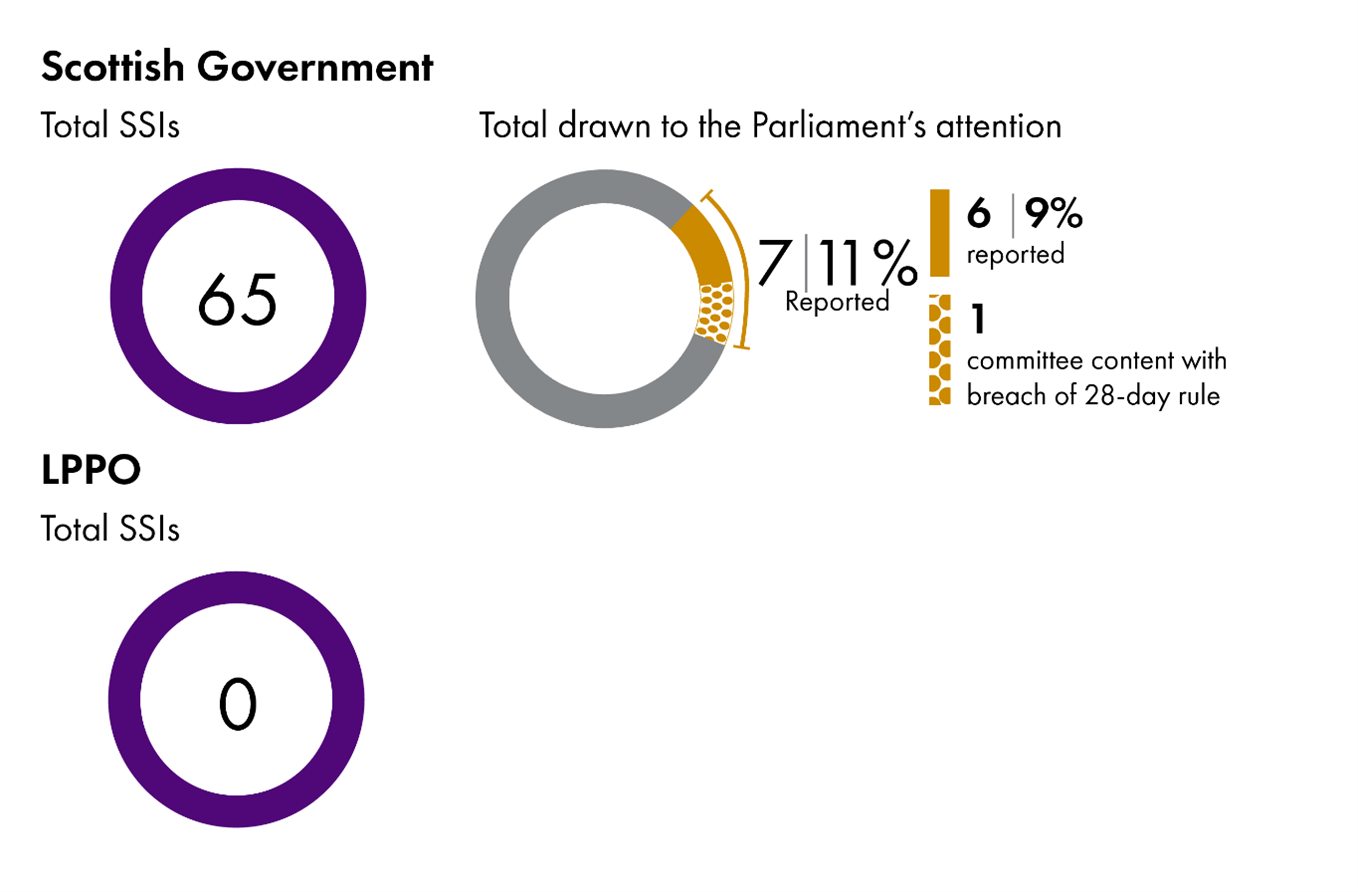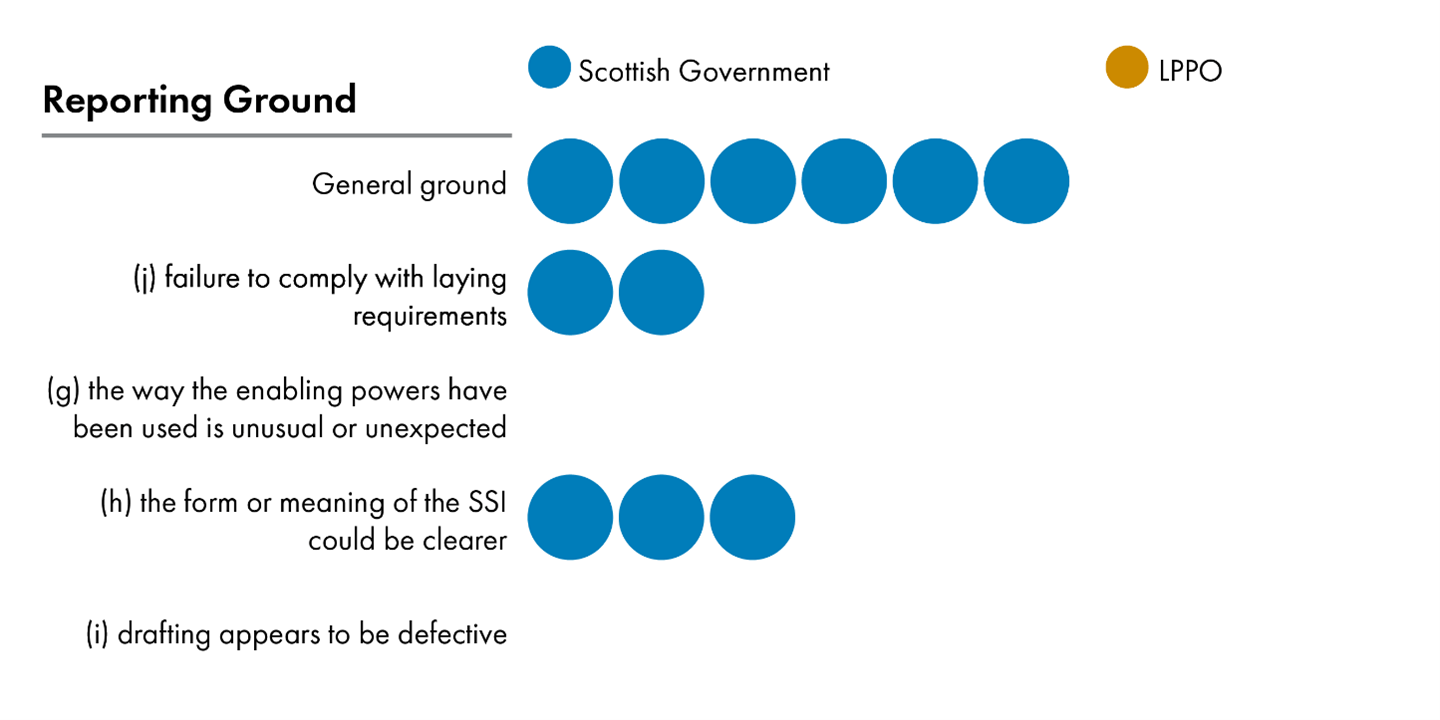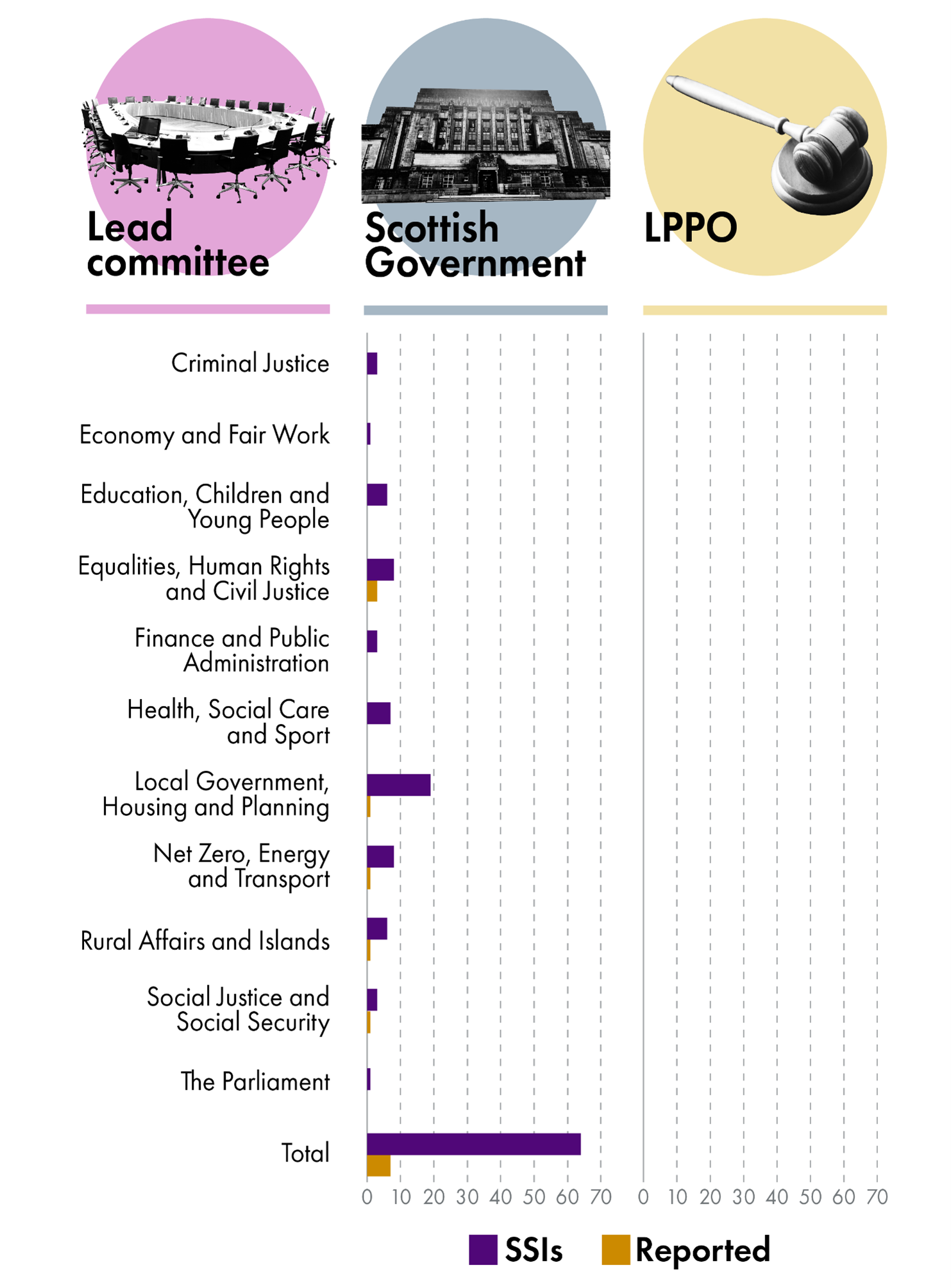Delegated Powers and Law Reform Committee
Instruments considered by the Delegated Powers and Law Reform Committee during the third quarter of the Parliamentary Year 2022-23
Summary
There was an increase of instruments considered in Quarter 3 of 2022-23 compared to Quarter 2 (65 and 43 respectively). This is an overall increase of 51%.
In terms of the number of instruments being reported, results for this quarter are slightly lower than the last; 11% of instruments being reported by the Committee compared to 12% in the previous quarter. Excluding those where the Committee was content with the explanation given for breaching the 28-day rule, these figures then alter to 9% in Quarter 3, compared with 5% in Quarter 2.
In relation to the seriousness of the reporting grounds, no instruments engaged serious grounds. There was also none in the previous quarter.
This quarter also saw a decrease of 50% of instruments being reported under reporting ground (j) (breaching of laying requirements); 2 compared with 4 in the previous quarter.
The Committee identified 11 Scottish Government instruments in which minor points were raised. There were 5 in the previous quarter.
During this period, the Committee considered 7 Bills at Stage 1 and 6 Legislative Consent Memorandums (LCMs) (which included 2 supplementary LCMs).
Introduction
The purpose of this report is to provide a record of the Committee’s scrutiny of instruments (e.g., Scottish statutory instruments (SSIs) and UK Statutory Instruments subject to joint procedure in the Scottish Parliament) during the first quarter of the parliamentary year 2022-23 during the period 9 December 2022 to 28 February 2023.
This report—
sets out details of instruments considered by the Committee which were drawn to the attention of the Parliament during the reporting period on one or more of the reporting grounds set out in Standing Orders;
touches briefly on the commitments made by the Scottish Government and the Lord President’s Private Office (LPPO) in response to the Committee’s comments and details any action that has been taken; and
outlines the Committee’s activity in respect of other matters within its remit.
As with previous quarterly reports, this report is intended to be more statistical than analytical to help inform the Committee’s annual report which goes into more detail on the work carried out by the Committee during the parliamentary year. However, the statistics can still be used to highlight emerging themes in advance of the annual report.
Overview and analysis
During the period 9 December 2022 to 28 February 2023, a total of 65 instruments were considered by the Committee. None were laid by the LPPO.
The 65 instruments laid by the Scottish Government are broken down as follows—
2 made affirmative instrument.
21 affirmative instruments.
34 negative instruments.
8 laid only instruments.
The infographic below provides a breakdown of instruments laid by the Scottish Government and the LPPO, and the total drawn to the Parliament’s attention—

The infographic shows that the Committee considered 65 instruments laid by the Scottish Government, of which 7 were drawn to the Parliament’s attention; 2 of these were reported under reporting ground (j) forbreaching the 28-day rule, of which the Committee was content with one of the explanations of the breaches. If 1 instrument is excluded from the total figure, the Committee reported 6 instruments, equating to 9% of the instruments considered.
This is in comparison to the previous quarter, when the Committee considered 41 instruments laid by the Scottish Government. The Parliament’s attention was drawn to 5 (12%) of these instruments, of which 4 were reported under reporting ground (j). The Committee was content with 3 of the explanations of the breaches. So, excluding these from the overall figure, 2 were reported which equates to 5% of the instruments considered.
Reporting grounds
Under paragraph (a) of Rule 6.11 of Standing Orders, the Committee may determine that the attention of the Parliament should be drawn to an SSI on one or more of a range of technical and legal grounds. These grounds are set out in Rule 10.3.1 of the Standing Orders.
The Committee considers some reporting grounds to be of more significance than others. The Committee has therefore determined that it has concerns where an instrument is drawn to the attention of the Parliament on one of the following grounds:
ground (e) – doubt as to whether it is intra vires;
ground (f) – raises a devolution issue; and
ground (i) – drafting appears to be defective.
These reporting grounds are referred to as the significant reporting grounds. The Committee considers every report under one of these grounds to be a serious matter as these raise fundamental legal questions and so there is the potential for the validity of the instrument to be questioned.
The infographic below provides a breakdown of the number of instruments reported-on by the relevant reporting ground (some instruments have been drawn to the Parliament’s attention for more than one reporting ground). A detailed list of the instruments reported on can be found at Annex A —

No instrument engaged in the more serious reporting grounds.
Withdrawal of instruments
No instruments were withdrawn and re-laid during this reported period.
By comparison, in quarter 2, two instruments were withdrawn and re-laid.
Instruments referred to Lead Committees
Summary
The Criminal Justice Committee received 3 instruments, none of which were drawn to the attention of the Parliament.
The Economy and Fair Work Committee received 1 instrument, which was not drawn to the attention of the Parliament.
The Education, Children and Young People Committee received 6 instruments, none of which were drawn to the attention of the Parliament.
The Equalities, Human Rights and Civil Justice Committee received 8 instruments, 3 of which were drawn to the attention of the Parliament under the reporting grounds, General and (h) Meaning could be clearer.
The Finance and Public Administration Committee received 3 instruments, none of which were drawn to the attention of the Parliament.
The Health, Social Care and Sport Committee received 7 instruments, none of which were drawn to the attention of the Parliament.
The Local Government, Housing and Planning Committee received 19 instruments, 1 of which was drawn to the attention of the Parliament under the reporting grounds, General and (j) failure to comply with laying requirements.
The Net Zero, Energy and Transport Committee received 8 instruments, 1 of which was drawn to the attention of the Parliament under the reporting grounds, General and (h) meaning could be clearer.
The Rural Affairs, Islands and Natural Environment Committee received 6 instruments, 1 of which was drawn to the attention of the Parliament under the reporting ground (j) failure to comply with laying requirements.
The Social Justice and Social Security Committee received 3 instruments, 1 of which was drawn to the attention of the Parliament under the reporting ground, General.
The Scottish Parliament received 1 instrument which went directly to the Chamber rather than to a subject committee. It was not drawn to the attention of Parliament under the reporting grounds.
Information detailing specific instruments, and the grounds that they were reported on, is provided in Annex A.
The infographic below provides a breakdown of instruments referred to, and reported on, by lead committees—

Scottish Statutory Instruments - General
Commitments
Scottish Government instruments
One instrument was laid by the Scottish Government during this period in relation to its commitment to lay an amending instrument to correct errors identified and reported on by the Committee:
First-tier Tribunal for Scotland Local Taxation Chamber and Upper Tribunal for Scotland (Rules of Procedure) (Miscellaneous Amendment) Regulations 2023 (SSI 2023/40) which amends the First-tier Tribunal for Scotland Local Taxation Chamber (Rules of Procedure) Regulations 2022 (SSI 2022/364) and the Upper Tribunal for Scotland (Local Taxation Rules of Procedure) Regulations 2022 (SSI 2022/365).
A list of all outstanding Scottish Government commitments can be found at Annex B.
LPPO instruments
There are no outstanding LPPO commitments from this quarter, or from previous reporting periods.
Minor Points
The Committee identified a total of 11 instruments on which minor points were raised (generally relating to typographical or referencing errors) compared with 5 instruments identified in Quarter 2. All of the relevant instruments were laid by the Scottish Government.
Summary
Although the focus of this report is primarily on the Committee’s activities in relation to its scrutiny of instruments, the following section briefly outlines the Committee’s activity in respect to other matters.
Bills
The Committee published six reports on the delegated powers provisions in the following Bills at Stage 1—
Legislative Consent Memorandums (LCMs)
Paragraph 6 of Rule 9B.3 of Standing Orders provides that where a UK Bill that is the subject of a Legislative Consent Memorandum (LCM) contains provisions conferring on the Scottish Ministers powers to make subordinate legislation, the Delegated Powers and Law Reform Committee shall consider and may report to the lead committee on those provisions.
Rule 6.11.1(b) of Standing Orders provides that the remit of the Committee includes considering and reporting on proposed powers to make subordinate legislation in particular bills “or other proposed legislation”. The Committee and its predecessor Committee have considered powers conferred on UK Ministers in devolved areas in various UK bills over the course of sessions 5 and 6.
Six LCMs were considered during this reporting period in relation to the following UK Parliament Bills —
Lodged on 23 November 2022 and the Committee considered this on 20 December 2022. The Committee published its report on relevant powers in the bill on 21 December 2022. The bill confers powers in areas of devolved competence on the Chief Constable of the British Transport Police (with consent of Scottish Ministers) and UK Ministers.
Lodged on 30 September 2022 and the Committee considered this on 10 and 24 January 2023. The Committee published its report on relevant powers in the bill on 27 January 2023. The bill confers a power exercisable by Scottish Ministers.
Lodged on 13 December 2022 and the Committee considered this on 10 January 2023. The Committee published its report on the relevant power in the Bill, as amended, on 11 January 2023. The bill confers a power exercisable by UK Ministers in devolved areas.
Lodged on 28 September 2022 and the Committee considered this on 7 February 2023. The Committee published its report on relevant powers in the bill on 10 February 2023. The bill confers powers exercisable by UK Ministers in devolved areas and confers one power on Scottish Ministers.
Lodged on 3 February 2023 and the Committee considered this on 21 February 2023. The Committee published its report on relevant powers in the bill, as amended, on 22 February 2023. The bill confers powers exercisable by Scottish and UK Ministers in devolved areas.
Lodged on 8 November 2022 and the Committee considered this on 29 November, 13 and 20 December, and 10 January 2023. The Committee published its report on relevant powers in the bill on 16 January 2023. The bill confers powers exercisable by Scottish and UK Ministers in devolved areas.
Annex A – Reporting grounds: 9 December 2022 to 28 February 2023
General
First-tier Tribunal for Scotland (Transfer of Functions of the Council Tax Reduction Review Panel) Regulations 2023 (SSI 2023/Draft) Equalities, Human Rights and Civil Justice Committee
Social Security (Up-rating) (Miscellaneous Amendments) (Scotland) Regulations 2023 (SSI 2023/Draft) Social Justice and Social Security Committee
First-tier Tribunal for Scotland Housing and Property Chamber (Amendment) Regulations 2023 (SSI 2023/6) Local Government, Housing and Planning Committee
Road Works (Reinstatement Quality Plans, Qualifications of Supervisors and Operatives and Miscellaneous Amendments) (Scotland) Regulations 2023 (SSI 2023/33) Net Zero, Energy and Transport Committee
First-tier Tribunal for Scotland Local Taxation Chamber (Rules of Procedure) Regulations 2022 (SSI 2022/364) Equalities, Human Rights and Civil Justice Committee
Upper Tribunal for Scotland (Local Taxation Rules of Procedure) Regulations 2022 (SSI 2022/365) Equalities, Human Rights and Civil Justice Committee
(h) – meaning could be clearer
First-tier Tribunal for Scotland Local Taxation Chamber (Rules of Procedure) Regulations 2022 (SSI 2022/364) Equalities, Human Rights and Civil Justice Committee
Upper Tribunal for Scotland (Local Taxation Rules of Procedure) Regulations 2022 (SSI 2022/365) Equalities, Human Rights and Civil Justice Committee
Road Works (Reinstatement Quality Plans, Qualifications of Supervisors and Operatives and Miscellaneous Amendments) (Scotland) Regulations 2023 (SSI 2023/33) Net Zero, Energy and Transport Committee
(j) - failure to comply with laying requirements
Official Controls and Import Conditions (Transitional Periods) (Miscellaneous Amendment) (Scotland) Regulations 2022 (SSI 2022/371) Rural Affairs and Islands and Committee
First-tier Tribunal for Scotland Housing and Property Chamber (Amendment) Regulations 2023 (SSI 2023/6) Local Government, Housing and Planning Committee
Annex B – Historic Commitments Scottish Government
Scotland Act 1998 (Specification of Functions and Transfer of Property etc.) Order 2019 (SSI 2019/183) [11th Report, 2019. Published 06/03/2019] commitment to bring forward an amendment at the earliest opportunityi